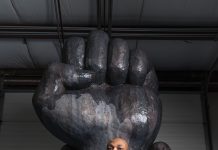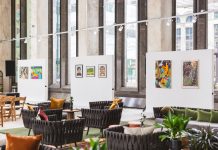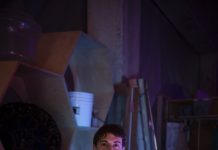Darius Baber, a native╠²of Detroit, was overjoyed to learn that would be a place where he could use his artistic abilities.
Through the , which exhibits interactive contemporary art for the Detroit community, Baber was tasked with creating a phase of art installations beginning at Jefferson Ave. and continuing down Chene St. toward the waterfront venue.
ÔÇ£I felt incredibly excited about the opportunity to celebrate the parkÔÇÖs rich musical heritage and its significance within the local community,ÔÇØ the 34-year-old said of the assignment.
The installation was to be a series of illuminated structures embedded with images based on iconic musicians with ties to Motown and Detroit ÔÇö╠²but instead of utilizing paint and a paintbrush for the assignment, he used digital art for the first time.
ÔÇ£We initially just planned on painting Motown artists, but as the project developed, we decided to broaden it and include other musicians with connections to Detroit,ÔÇØ he said.
Aretha Franklin, Stevie Wonder, Marvin Gaye, Diana Ross, David Ruffin, Otis Redding, Ron Isley, Gladys Knight, and Tammi Terrell are all featured in the nine vibrant, large-scale art installations.
ÔÇ£Selecting the musicians for my artwork was a thoughtful process,ÔÇØ Baber explained. ÔÇ£I wanted to pay homage to my favorite artists who have greatly influenced me [and] it was important to me to have a balanced representation of male and female musicians.ÔÇØ
But it was more than just another project for the artist. It held immense personal significance to him by not only showcasing his creative expression, but also being his first venture into public art ÔÇö a significant milestone after more than a decade of painting and an art career that almost wasnÔÇÖt.
ÔÇ£As a child, I was deeply fascinated by art and found joy in expressing myself through drawings,ÔÇØ he said. ÔÇ£I enjoyed drawing cartoons and creating art inspired by my surroundings. However, it wasnÔÇÖt until I met an art teacher who inspired me to pursue a creative career that I began to consider it as a viable career path.ÔÇØ
After entering several art competitions and receiving national recognition, Baber decided to attend the College for Creative Studies in Detroit to further his education in art, but after a year he had to drop out due to financial constraints.
I continued to pursue my passion for art with photography, Baber explained. I started a photography business; however, it didnt work out as planned, and I found myself feeling discouraged [] but then I turned back to painting, and it was then that I started to come back to myself and my passion for creating.
These days, Baber has developed a distinctive technique to make his art pop.
ÔÇ£My artwork stands out due to the creative use of color and texture, which adds a unique depth and visual appeal to my pieces,ÔÇØ he explained. ÔÇ£IÔÇÖm also committed to capturing the true essence of my subjects, whether they are musicians or places, which is evident in the attention to detail and authenticity present in my work.ÔÇØ
The detail he presents in his work shows up in the intricacy of the 10-foot-tall installations at The Aretha Franklin Amphitheatre, which he says was not a quick project to complete.
ÔÇ£The creation of these pieces was a time-consuming but rewarding process,ÔÇØ he said. ÔÇ£Considering my involvement in multiple projects and the necessary back-and-forth during Zoom meetings, it took about a month of actual painting and repainting to perfect the portrayal of each artist. Altogether, the entire process took several months.ÔÇØ
But the time spent on this project was well worth it to Baber who says that he hopes the installation becomes a source of pride and cultural identity for the community.
ÔÇ£I want people to feel a strong sense of ownership and connection to these murals, as they represent the musical icons who have significantly contributed to DetroitÔÇÖs and MotownÔÇÖs remarkable artistic legacy,ÔÇØ he said. ÔÇ£Through these pieces, I celebrate the cityÔÇÖs musical heritage and [hope to] inspire a sense of unity among its residents.ÔÇØ
BaberÔÇÖs art installation starts at Jefferson Ave. in Detroit and heads down Chene St. toward The Aretha Franklin Amphitheatre. They are open for the public to view. Find even more metro Detroit art news at ║┌┴¤═°Detroit.com.
|
| ╠² |
|








